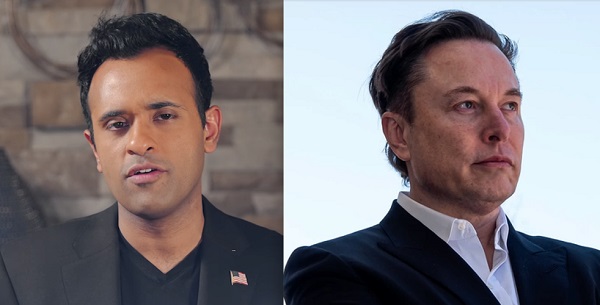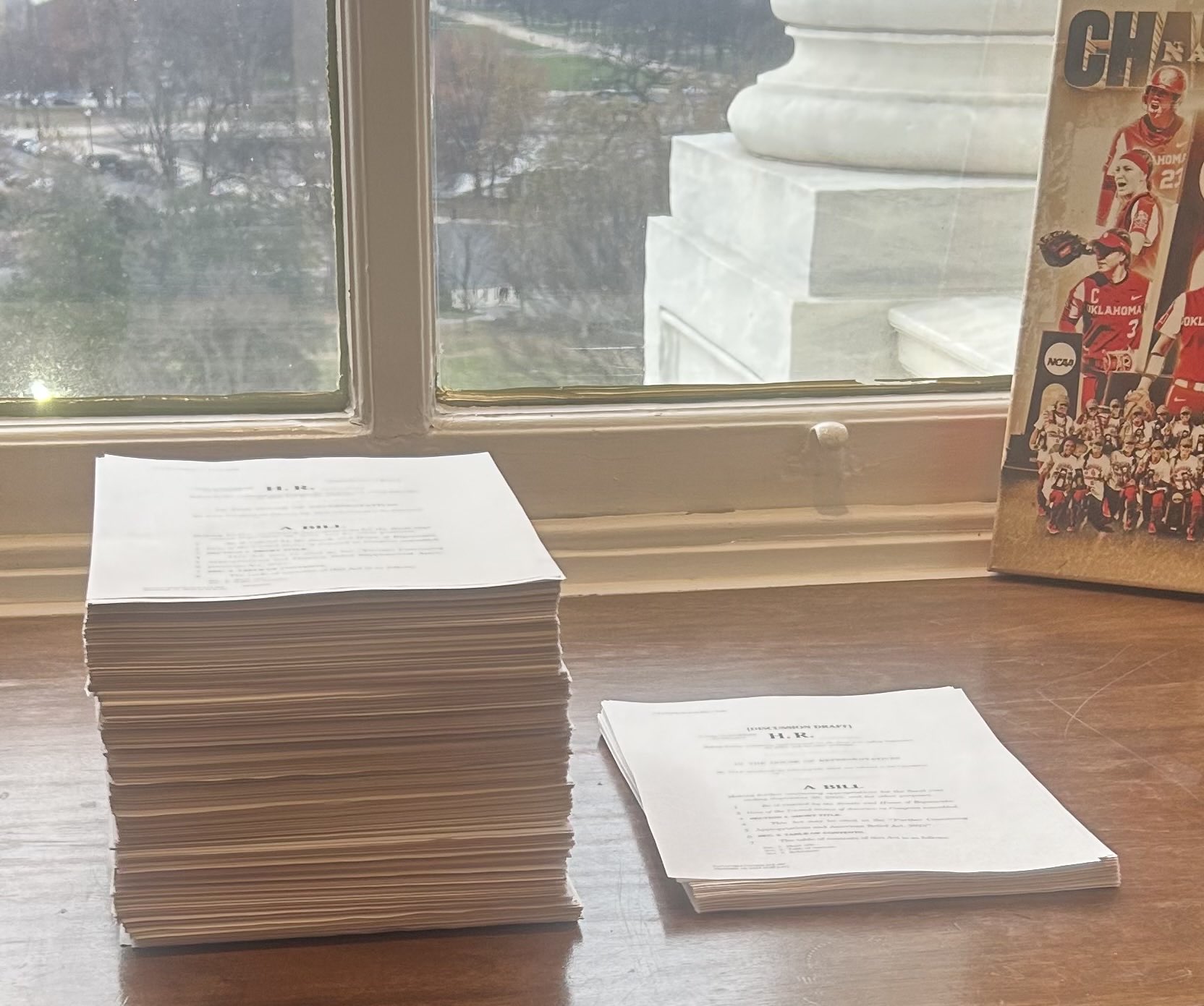Business
DOGE already on the job: How Elon Musk and Vivek Ramaswamy caused the looming government shutdown

Legislators had 24 hours to read through 1,547 pages. Ramaswamy read them. Musk presented an alternative. The process collapsed.
Elon Musk and Vivek Ramaswamy are flexing their muscles even before President Elect Donald Trump’s inauguration, spiking a bipartisan spending bill. The bill was introduced on Tuesday with voting scheduled for Wednesday. Legislators were under massive pressure to approve of the spending bill or risk a government shut down. Problem is, the bill was over 1,500 pages long!
Chances are, the bill would have passed and in the ensuing weeks as details became known the public would have been outraged by all the extra plans to spend / waste taxpayer dollars. Legislators would have apologized by saying they simply had no time to read everything and they were desperate to avoid a shut down.
That’s where the new DOGE comes in. First Ramaswamy somehow read the bill and posted a video to TikTok and X to inform voters what they were going to be paying for in this new bill.
@vivekramaswamy Congress wants to waste your money without telling you, make sure that doesn’t happen
From MXMNews
The newly formed Department of Government Efficiency (DOGE), led by Elon Musk and Vivek Ramaswamy, successfully campaigned to halt the bipartisan continuing resolution (CR) in Congress. Musk and Ramaswamy took to X, rallying conservatives against the 1,547-page stopgap funding measure they argue is riddled with wasteful spending and unnecessary policy provisions.
Musk, a billionaire entrepreneur and vocal advocate for government reform, characterized the bill as a “pork-barrel” monstrosity. “Unless @DOGE ends the careers of deceitful, pork-barrel politicians, the waste and corruption will never stop,” Musk posted on X, adding that lawmakers who support the bill should be “voted out in two years.”
Meanwhile, Ramaswamy, a former Republican presidential candidate and DOGE co-chair, proposed an alternative to the bulky spending bill. Sharing a draft of his one-page resolution, he described it as a minimalist approach that avoids exacerbating historical spending excesses. “This is what a clean CR looks like,” he wrote, emphasizing the need for fiscal restraint.
Musk and Ramaswamy posted this to X.
Shorter = better. This bill is only 116 pages, instead of 1,500+ pages. Took a LOT less time to read. Glad to see the following garbage from yesterday’s bill removed in the current version: – Congressional pay raise/health benefits – 17 miscellaneous commerce bills – Random new pandemic policies, like funding for “biocontainment research laboratories” – Renewal of the “Global Engagement Center,” a key player in the federal censorship state
In record time, the public was informed, politicians were influenced by outraged taxpayers, and politicians blamed each other for a faulty bill and were forced to go back to the drawing board.
It’s all explained very well in this video presentation from Kaizen Asiedu, a Harvard graduate in philosophy who makes videos informing Americans about complicated political matters.
Friday’s deadline to avoid a government shutdown looms. Musk posted on X that a shutdown would be “infinitely better than passing a horrible bill.” His DOGE partner Vivek Ramaswamy urged Americans to contact their representatives to “stop the steal of your tax dollars.”
And President-elect Donald Trump posted this: “If Democrats threaten to shut down the government unless we give them everything they want, then CALL THEIR BLUFF,”.
Should the spending bill fail, it will mark a significant victory for DOGE and a potential turning point in efforts to reform Washington’s spending habits.
Business
Most Canadians say retaliatory tariffs on American goods contribute to raising the price of essential goods at home

- 77 per cent say Canada’s tariffs on U.S. products increase the price of consumer goods
- 72 per cent say that their current tax bill hurts their standard of living
A new MEI-Ipsos poll published this morning reveals a clear disconnect between Ottawa’s high-tax, high-spending approach and Canadians’ level of satisfaction.
“Canadians are not on board with Ottawa’s fiscal path,” says Samantha Dagres, communications manager at the MEI. “From housing to trade policy, Canadians feel they’re being squeezed by a government that is increasingly an impediment to their standard of living.”
More than half of Canadians (54 per cent) say Ottawa is spending too much, while only six per cent think it is spending too little.
A majority (54 per cent) also do not believe federal dollars are being effectively allocated to address Canada’s most important issues, and a similar proportion (55 per cent) are dissatisfied with the transparency and accountability in the government’s spending practices.
As for their own tax bills, Canadians are equally skeptical. Two-thirds (67 per cent) say they pay too much income tax, and about half say they do not receive good value in return.
Provincial governments fared even worse. A majority of Canadians say they receive poor value for the taxes they pay provincially. In Quebec, nearly two-thirds (64 per cent) of respondents say they are not getting their money’s worth from the provincial government.
Not coincidentally, Quebecers face the highest marginal tax rates in North America.
On the question of Canada’s response to the U.S. trade dispute, nearly eight in 10 Canadians (77 per cent) agree that Ottawa’s retaliatory tariffs on American products are driving up the cost of everyday goods.
“Canadians understand that tariffs are just another form of taxation, and that they are the ones footing the bill for any political posturing,” adds Ms. Dagres. “Ottawa should favour unilateral tariff reduction and increased trade with other nations, as opposed to retaliatory tariffs that heap more costs onto Canadian consumers and businesses.”
On the issue of housing, 74 per cent of respondents believe that taxes on new construction contribute directly to unaffordability.
All of this dissatisfaction culminates in 72 per cent of Canadians saying their overall tax burden is reducing their standard of living.
“Taxpayers are not just ATMs for government – and if they are going to pay such exorbitant taxes, you’d think the least they could expect is good service in return,” says Ms. Dagres. “Canadians are increasingly distrustful of a government that believes every problem can be solved with higher taxes.”
A sample of 1,020 Canadians 18 years of age and older was polled between June 17 and 23, 2025. The results are accurate to within ± 3.8 percentage points, 19 times out of 20.
The results of the MEI-Ipsos poll are available here.
* * *
The MEI is an independent public policy think tank with offices in Montreal, Ottawa, and Calgary. Through its publications, media appearances, and advisory services to policymakers, the MEI stimulates public policy debate and reforms based on sound economics and entrepreneurship.
Business
B.C. premier wants a private pipeline—here’s how you make that happen

From the Fraser Institute
By Julio Mejía and Elmira Aliakbari
At the federal level, the Carney government should scrap several Trudeau-era policies including Bill C-69 (which introduced vague criteria into energy project assessments including the effects on the “intersection of sex and gender with other identity factors”)
The Eby government has left the door (slightly) open to Alberta’s proposed pipeline to the British Columbia’s northern coast. Premier David Eby said he isn’t opposed to a new pipeline that would expand access to Asian markets—but he does not want government to pay for it. That’s a fair condition. But to attract private investment for pipelines and other projects, both the Eby government and the Carney government must reform the regulatory environment.
First, some background.
Trump’s tariffs against Canadian products underscore the risks of heavily relying on the United States as the primary destination for our oil and gas—Canada’s main exports. In 2024, nearly 96 per cent of oil exports and virtually all natural gas exports went to our southern neighbour. Clearly, Canada must diversify our energy export markets. Expanded pipelines to transport oil and gas, mostly produced in the Prairies, to coastal terminals would allow Canada’s energy sector to find new customers in Asia and Europe and become less reliant on the U.S. In fact, following the completion of the Trans Mountain Pipeline expansion between Alberta and B.C. in May 2024, exports to non-U.S. destinations increased by almost 60 per cent.
However, Canada’s uncompetitive regulatory environment continues to create uncertainty and deter investment in the energy sector. According to a 2023 survey of oil and gas investors, 68 per cent of respondents said uncertainty over environmental regulations deters investment in Canada compared to only 41 per cent of respondents for the U.S. And 59 per cent said the cost of regulatory compliance deters investment compared to 42 per cent in the U.S.
When looking at B.C. specifically, investor perceptions are even worse. Nearly 93 per cent of respondents for the province said uncertainty over environmental regulations deters investment while 92 per cent of respondents said uncertainty over protected lands deters investment. Among all Canadian jurisdictions included in the survey, investors said B.C. has the greatest barriers to investment.
How can policymakers help make B.C. more attractive to investment?
At the federal level, the Carney government should scrap several Trudeau-era policies including Bill C-69 (which introduced vague criteria into energy project assessments including the effects on the “intersection of sex and gender with other identity factors”), Bill C-48 (which effectively banned large oil tankers off B.C.’s northern coast, limiting access to Asian markets), and the proposed cap on greenhouse gas (GHG) emissions in the oil and gas sector (which will likely lead to a reduction in oil and gas production, decreasing the need for new infrastructure and, in turn, deterring investment in the energy sector).
At the provincial level, the Eby government should abandon its latest GHG reduction targets, which discourage investment in the energy sector. Indeed, in 2023 provincial regulators rejected a proposal from FortisBC, the province’s main natural gas provider, because it did not align with the Eby government’s emission-reduction targets.
Premier Eby is right—private investment should develop energy infrastructure. But to attract that investment, the province must have clear, predictable and competitive regulations, which balance environmental protection with the need for investment, jobs and widespread prosperity. To make B.C. and Canada a more appealing destination for investment, both federal and provincial governments must remove the regulatory barriers that keep capital away.
-

 Bruce Dowbiggin2 days ago
Bruce Dowbiggin2 days agoThe Covid 19 Disaster: When Do We Get The Apologies?
-

 Crime1 day ago
Crime1 day agoSweeping Boston Indictment Points to Vast Chinese Narco-Smuggling and Illegal Alien Labor Plot via Mexican Border
-

 Alberta2 days ago
Alberta2 days agoAlberta school boards required to meet new standards for school library materials with regard to sexual content
-

 International21 hours ago
International21 hours agoSupport for the Ukraine war continues because no one elected is actually in charge.
-

 Business21 hours ago
Business21 hours agoTrump slaps Brazil with tariffs over social media censorship
-

 Environment1 day ago
Environment1 day agoEPA releases report on chemtrails, climate manipulation
-

 Business24 hours ago
Business24 hours agoCBC six-figure salaries soar
-

 Addictions23 hours ago
Addictions23 hours agoCan addiction be predicted—and prevented?







